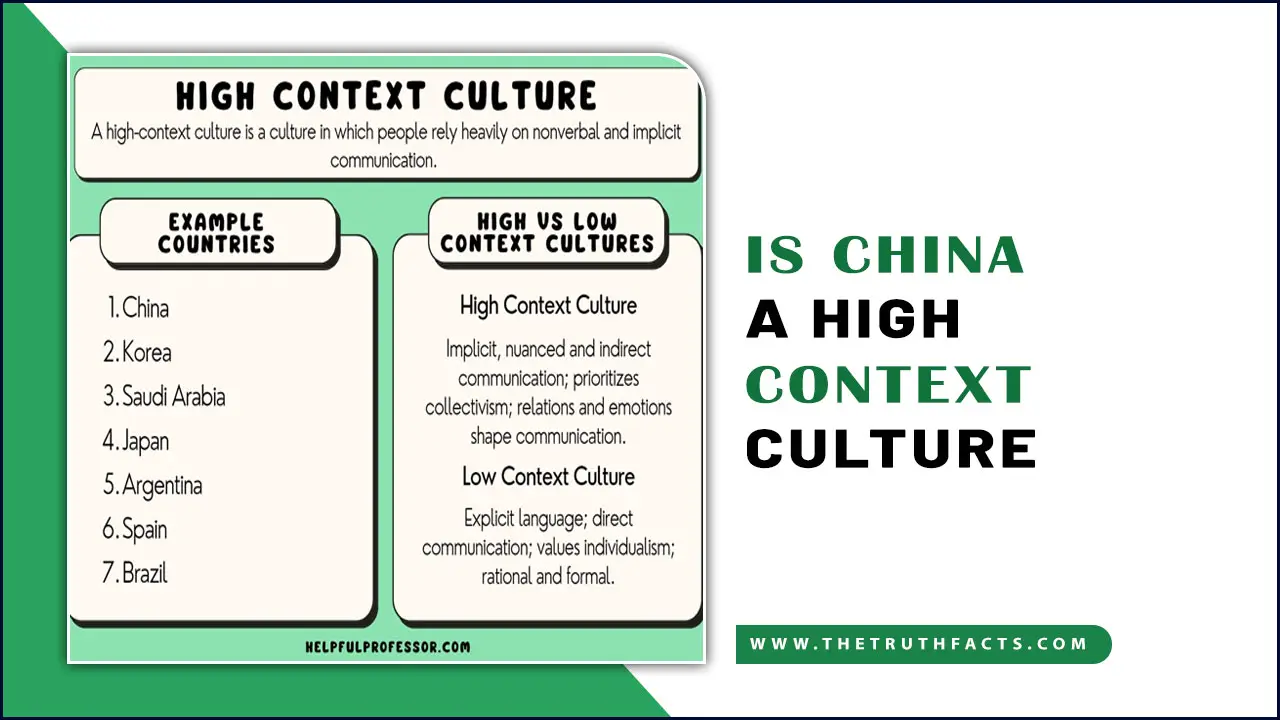China, a country with a rich history and a rapidly growing economy, has become a major player in the global arena. With its unique cultural traditions, values, and communication styles, China has often been described as a high-context culture.
This concept, popularized by anthropologist Edward T. Hall, refers to a society where indirect communication, nonverbal cues, and context play a crucial role in conveying meaning. In a high-context culture, information is often implied rather than explicitly stated, and relationships and hierarchy are highly valued.
Here, we will explore the concept of high-context culture in the Chinese context, examining its characteristics, implications, and how it affects communication and interactions. By the end, we hope to provide a deeper understanding of China’s cultural dynamics and the importance of cultural competence in navigating this complex society.

Definition Of High Context Culture
High context culture refers to a cultural context communication style in which a significant amount of information is implied and understood through non-verbal cues, shared experiences, and social relationships. In high-context cultures, people rely on contextual factors and indirect communication to convey meaning rather than explicitly stating everything.
This type of Western culture values relationships, harmony, and the collective group over individualism. Examples of high-context cultures include Asian countries, Middle Eastern, and Latin American cultures.
Characteristics Of High Context Culture
Individuals in a high-context culture implicitly understand and share significant information. In high-context cultures, communication is often indirect and relies heavily on nonverbal cues, such as facial expressions, body language, and tone of voice. These cultures place a strong emphasis on building relationships and trust, as well as maintaining harmony within social groups. High-context cultures prioritize the collective over the individual and make decisions based on group consensus.
Analysis Of China As A High-Context Culture

Chinese people’s rich cultural heritage influences their communication style and social interactions. Studies have shown that China considers itself a high-context culture, where communication’s context and underlying meanings hold more value than explicit words. This edition of Chinese culture emphasizes non-verbal communication, such as facial expressions, body language, and gestures.
Additionally, people in China often use indirect communication, conveying messages subtly and indirectly. Building relationships and trust is paramount in Chinese culture, as it establishes a solid foundation for effective communication and successful interactions between individuals and nations. The status of relationships and the level of trust determine the degree of openness and honesty in communication exchanges.
Examples Of High Context Elements In Chinese Culture

Several high-context elements characterize Chinese culture. Firstly, Chinese people rely on symbolism and gestures to convey meaning and communicate subtly. Secondly, hierarchy and face-saving are deeply ingrained in their cultural dimensions, where individuals are expected to respect authority and maintain harmony.
Additionally, Chinese society operates on an implicit understanding of social rules and norms, where individuals must adhere to unwritten codes of conduct. Lastly, building relationships and trust are highly emphasized in Chinese culture, as they believe that strong interpersonal connections are crucial for successful interactions.
In contrast, American countries tend to have lower context cultures, where communication is more direct and explicit. Understanding and appreciating these cultural differences requires a deep breath and a willingness to embrace diverse social norms.
Implications Of China Being A High Context Culture
China’s high-context culture presents various challenges for cross-cultural communication and understanding. Due to the emphasis on non-verbal cues, gestures, and contextual information, the message may differ from the literal words spoken. Thus, conducting an analytic study of Chinese cultural norms and practices is crucial to navigating actual communication situations effectively.
Strategies such as developing cultural intelligence, building relationships, and adapting communication styles can enhance effective communication with Chinese business partners. Understanding the nuances of a high-context culture like China is essential for successful cross-cultural interactions.
Traditional Etiquette

Traditional etiquette is an important aspect of China’s high-context culture. By understanding and practising these traditional etiquettes, you can respect Chinese customs and traditions while fostering positive relationships in both personal and professional settings. Here are some key points to keep in mind when navigating social interactions in Chinese culture:
- Greetings: When meeting someone for the first time, greeting them with a slight bow and a handshake is customary.
- Gift Giving: Gift giving is an important part of Chinese culture and is often done to show respect and build relationships.
- Dining Etiquette: Table manners are highly regarded in Chinese culture. It is polite to wait for the host or elder to eat before you begin.
- Business Etiquette: When conducting business in China, it is crucial to be respectful and patient.
Business Practices In China
One such cultural aspect that holds great significance is the concept of high-context culture. People in high-context cultures characterize implicit communication, where they convey meaning through words, non-verbal cues, gestures, and shared experiences. Business practices in China can vary significantly from those in other African countries. Here are some key points to consider:
- Guanxi (Personal Relationships): Building strong relationships is crucial in Chinese business card culture. We highly value networking and establishing trust with business partners and government officials.
- Face (Mianzi): Maintaining face or preserving one’s reputation is important in Chinese business interactions. We should avoid criticizing or embarrassing someone publicly.
- Hierarchical Structure: Chinese companies often have a hierarchical structure with clear lines of authority. Decision-making processes can be lengthy and involve multiple levels of approval.
- Gift-Giving: Exchanging gifts is common in Chinese business culture, especially during festivals or building relationships. However, knowing gift-giving etiquette and avoiding extravagant or inappropriate gifts is important.
- Business Negotiations: Patience is key during negotiations in China. It is common for Chinese negotiators to take their time and engage in extensive discussions before reaching a final agreement. Building trust and understanding the other party’s interests is crucial.
- Face-To-Face Meetings: are highly valued in Chinese business culture, allowing for relationship-building and trust-building. Schedule regular visits to China to maintain business connections.
- Language And Communication: While English is spoken in many business settings, it is beneficial to have some understanding of Mandarin Chinese. Hiring interpreters or having bilingual staff can facilitate effective communication.
Cultural Adaptation In China

Cultural adaptation in China refers to adjusting and assimilating to the cultural norms, values, and practices of Chinese society. China has a rich history, diverse traditions, and unique cultural characteristics. When adapting to Chinese culture, individuals may need to learn and understand social etiquette, language, cuisine, customs, and beliefs.
Chinese society places great importance on respect for elders, hierarchical relationships, and collectivism. Individuals commonly address others by their titles or proper honorifics and highly value maintaining harmonious relationships. Learning basic Mandarin phrases and understanding Chinese dining etiquette can greatly enhance adaptation.
Conclusion
It can be said that China is indeed a high-context culture where emphasis is placed on implicit communication, relationships, and harmony. Their long history, collectivist values, and Confucian principles contribute to this. As business professionals, it is important to understand and adapt to the high context nature of Chinese culture to build successful relationships and conduct business effectively.
With a better understanding of high-context communication, we can foster stronger relationships and successfully collaborate with our Chinese counterparts. By demonstrating cultural sensitivity and developing strong interpersonal connections, one can navigate the complexities of China’s high-context culture and achieve mutual success.
FAQs
What Is A High-Context Chinese Culture?
A high-context Chinese culture refers to a society where communication is primarily based on implicit and indirect means. It emphasizes nonverbal cues, shared understanding, and a deep understanding of cultural norms and values.
What Does High-Context Communication Mean?
High-context communication refers to a style of communication where the meaning of messages is heavily dependent on the context, such as non-verbal cues, shared experiences, and cultural norms.
Which Communication Method Is More Effective In High-Context Cultures?
In high-context cultures, communication methods that rely on indirect and nonverbal communication are generally more effective. These cultures place a high value on relationships, shared experiences, and context and prefer communication methods that emphasize temphasizeents.
What Are Some Benefits Of A High-Context Communication Style?
Some benefits of a high-context communication style include the ability to communicate more efficiently and effectively within a close-knit group or culture, as there is a shared understanding of context and background information.
What Is The Importance Of High Context?
High-context communication is important because it relies heavily on shared cultural knowledge, non-verbal cues, and indirect communication.

I’m a writer and blogger who loves to talk about entertainment, culture, and relationships. I love to share my thoughts and insights on these topics, and I’m always looking for new ways to engage with my readers. I’m also a big fan of learning new things, so I’m always exploring new areas of interest.
